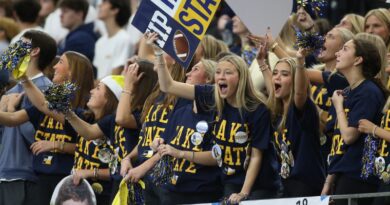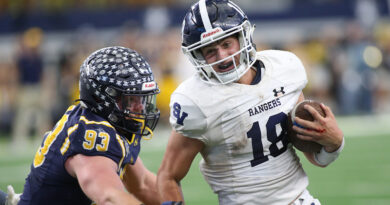HP Takes Second-Straight Academic Decathlon State Title
When Highland Park earned its first academic decathlon state title last year, there was lots of cheering and celebrating. This year’s reaction was more subdued.
“Our team motto is, ‘We did it once, we can do it again,” decathlete Wyatt Hill said. “We felt like we’d better win or we were going to look stupid if we didn’t.
Hill, along with fellow senior Brooke Yung and junior Michael Xie, represented the team both years. While proud of their impressive feat, they aren’t ready to sit back and revel in the moment yet.
“It was still exciting to win state, but this felt more like the next step on the path to our goal,” said senior Rachel Korn, who was an alternate last year. “This year has been more nationals-focused.”
Nationals will be held April 20-22 in Madison, Wisconsin. The team has been preparing since last spring.
Academic Decathlon is divided into 10 categories: science, social science, music, language and literature, art, math, economics, essay, speech, and interview or impromptu speaking. Team members are placed in either the honors, scholastic, or varsity divisions, based on their grade point average.
“That’s the politically correct way to say, ‘A student, B student, and C student,” Hill said.
The team score is calculated by combining the results of two students, known as “counters,” from each category.
Every spring, the United States Academic Decathlon organization determines the topic for all participants.
This year’s focus is World War II. By the time the 2016 school year ended, decathletes already were busy reading the 1940s-era novel Transit by Anna Seghers. They were also analyzing the effect of government spending on the wartime economy and studying the lessons in nuclear physics that the Manhattan Project used to develop the atomic bomb.
“It was fascinating learning all of these references, and being able to see how all these things created in World War II still affect us today,” senior Abby Warren said.
“What really motivated me was interest in the material itself,” Xie added. “No matter how boring it may be presented in the format, the message behind it is really interesting.”
The beginning of the school year ushered in the start of almost daily testing during academic decathlon class. According to Hill, the biggest misconception people have about academic decathlon is that the coaches are teaching them.
“Other than the math, this is all stuff that we have read by ourselves,” he said.
Coach David Alvarado said this year’s squad began as maybe the weakest math team he has ever had. However, they turned out to be the best math team in Texas over the past 15 years.
“I think they are focused on the bigger prize,” Alvarado said. “They knew that they had a weakness, and they’ve been addressing it. And while it may not be a strength, it’s no longer a weakness anymore.”
Alvarado said the program forces students to learn what methods work best for them. Hill relied heavily on hundreds of pages of notes. Yung said she learned better by constantly testing herself with self-made quizlets, while Korn relied heavily on re-reading and highlighting important passages.
“That’s what I really like about this program,” Alvarado said. “Everybody gets to test their game plan every single day and get better and better. You know what you are capable of after going through this.”
Decathlon Categories:
2016-17 Theme: World War II
– Science
– Social Studies
– Music
– Language and Literature
– Art
– Math
– Economics
– Essay
– Speech
– Interview/Impromptu








